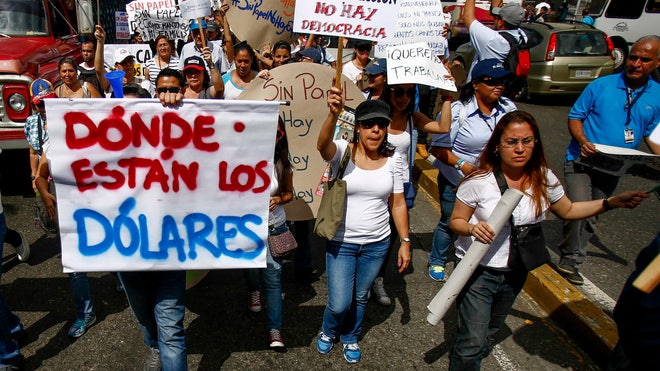This week saw three major developments in Latin America; in
alphabetical order, Argentina finally produced a meaningful inflation index,
Brazil officially slipped into a recession, and at least two people were killed
in student protests against the Government in Venezuela.
There is a tragic inevitability about the protests in
Venezuela; as the Government has radicalized and demonized any who don’t
support it, they have left those who have genuine grievances nowhere to express
their views in a peaceful manner. At the same time, the continued and extensive
shortages of basic goods, from foodstuffs like flour to necessities like toilet
paper are leaving people increasingly frustrated and disenchanted.
Toyota recently joined the long list of those cutting back
on their Venezuelan operation when they announced that they would no longer be
assembling vehicles in the country. The lack of dollars means that their
just-in-time inventory management simply does not work, and even old-fashioned
stock management is problematic because there is no way to plan stocks since
there is no way of knowing when dollars will be available. In the unlikely
event dollars do become available, there is no way of knowing at what exchange
rate they can be bought, and at what exchange rate the finished product can be
sold. Meanwhile, official waiting lists at car dealerships are apparently years
long.
Unfortunately Maduro’s position is too weak for him to
compromise. There are many within his own party, such as Diosdado Cabello, who
are waiting for the right time to push him aside His weakness is forcing him to
be “more Chavez than Chavez”. When faced with the withdrawal of firms like
Toyota or the increasing shortages of basic goods, President Maduro has fallen
back on increasingly bellicose rhetoric, but without the humility shown by the
late President; when 20 000 tons of food rotted in Government run warehouses
during the early days of the food shortages, Chavez was at least able
recognized this as a Government problem and to promised to do better. As power
cuts have spread into Caracas, Maduro has increasingly railed against
“sabotage” by “Fascists” and “Antigovernment interests”.
The events of this week were truly tragic, and probably only
the beginning. Please may I be wrong.
Brazil’s recession was equally inevitable. I believe I have nagged
you enough about the failure of the current Government to enact any meaningful
reforms, whilst they remain transfixed by next October’s presidential
elections. There is so much that Finance Minister Mantega could have done to
avoid the slowdown, but instead he fell back on the usual tried and failed
policies of the past.
The ongoing protest against the World Cup are also directly
linked to the weakness in the economy; many of the protestors have made it
clear they want to see an improvement in Government services, from education to
healthcare, whilst Inflation, although low by historic standards, is seen as a
problem.
I believe, and I hope I am not being naïve in this, that the
protests in Brazil are about as bad they are going to get. All sides recognized
the tragic death of TV cameraman Santiago Andrade as unacceptable, whilst the
Government has enlisted Pele to be their PR spokesman for why the World Cup
should still take place. The fact that they are even launching such a PR campaign
shows that they realize how big their problems really are. Once the games
start, Brazil’s love of the beautiful game will replace any resentment over
Government policies. It will then be up to the Government to build on that
peace rather than squander it like they have squandered so much in recent
years.
Argentina has not, as far as I am aware, suffered from the same
level of street protests in recent weeks as either Brazil or Venezuela, but I think
they are coming.
As I mentioned in the introduction, the Argentine Government
has stopped lying about inflation. They have just announced a new index that
more accurately tracks price changes, and it even appears to give a higher
reading than previous private estimates. The January reading was 3.7% that
annualizes out at 50%. Other private estimates were in the range of 25-30%,
whilst official numbers were only 10.9% for 2013. They did not, however, rework
previous numbers.
The recent devaluation of the peso will cause inflation to
accelerate farther just as the Government tries to bring public spending under
control. This in turn is likely to lead to conflict between the Government and
unions as the Government is forced to backtrack on its “Social Justice”
commitments; they have run out of their own money, and their inability to tap
international capital markets means they do not have access to other people’s.
There are early signs that the economy is going into
recession, if it is not already there – shorter work hours, holidays being
brought forwards, possible rising unemployment.
Taking these together, and Argentina’s history of protests,
it is highly likely that the erosion of purchasing power and the Government’s
inability to fund its programs will bring Argentines out onto the streets in a
rerun of the Cacarolazos protests that followed the 2001 financial crisis.
2014 is shaping up to be a noisy year in Latin America.

No comments:
Post a Comment